From an entry-level developer straight out of college, all the way to a seasoned one looking for the best position where they can grow and stay motivated, there is a wide range of jobs in the tech industry.
Still, no matter where you are in your career path, searching for a new job can be stressful. Finding the best-fitting company and culture that meets your expectations and enables you to work on projects you are passionate about might prove to be a difficult task. Not to mention the stress that comes with applying for a job, doing interviews and test assignments, sometimes while working another job.
Since we are a company that helps more than 1000 developers find the best tech companies to work at, we figured we’d write a guide for individuals looking for advice on how to manage their careers and thrive. In it, we’ll cover everything from writing a good resume and cover letter, to how you can research the companies you are considering working for.
Before you start your job search
Most of the time, the reason to look for a new job position is highly individual. Factors such as education, past experience, tech stack, soft skills and compensation expectations are also something that can really influence your job search.
This is why you need to make a checklist with some factors that will help you grade particular opportunities and rule out anything that isn’t fitting for you. Hopefully, you are in the position to make these big decisions and not just accept whichever position you are offered.
Here is what you should do depending on the reason why you are looking for a job.
Looking for a job at the start of your career
Trying to find a job just after getting your bachelor’s degree without any relevant experience is a vicious circle. Still, there is a way out of it if you know how to present yourself well and are a proactive person.
Chances are, you have some internship or volunteer experience, even in a field irrelevant to your current job of interest. And if not, now is the time to get it. There are many competitions, hackathons and pro-bono engagements on which you can get some relevant experience.
You should also take some time to refresh your social media profiles, especially LinkedIn. If you don’t have an account, open one and start slowly growing your network and posting things. Ask your university colleagues or mentors to give you a recommendation.
Another thing you should consider is accepting a job that isn’t full-time in the beginning. If you can afford a gig, a part-time or flexible engagement, it can get you some experience to add to your CV.
Searching for a better-paid position
It is normal to feel like you deserve more after working the same job for a while. Especially if you kept growing, learning and adding more skills to your already rich resume.
Finding another job shouldn’t be a hard thing to do if you are a valuable and respected professional in your field, but how do you make sure you’re making the right choice by going after a better-paid position?
Think it through and see if the pros are bigger than the cons. Is the new offer something you’d enjoy doing in the long run? Do you find it an exciting and rewarding job? Does the company culture seem like a place you could see yourself belonging in?
And if you aren’t already talking with another company about joining their ranks, make sure you update your resume with your latest achievements, revamp your LinkedIn profile and start looking for the position with the most fitting job description. Another thing you could to to both help weight your chances better, and help the community, is to contribute to an open-source engagement.
Trying to find a better culture fit
After the positive trends in taking mental health into account, the remote work boom and the Great Resignation, it is very understandable to see not fitting into the company culturally as a valid reason to want to leave.
In such a case, make a list of priorities that would help you narrow down your options. Do proper research on possible job applications on Glassdoor and LinkedIn, or simply ask people in your existing network that are satisfied with the culture at their workplace if they have any vacancies.
Switching careers after having experience in a different industry or position
A scenario like this happens very often in development since it’s one of the fastest-growing industries that perpetually has a deficit of workforce. Even within the same industry, it’s not uncommon to gain extra skills and change your position from, let’s say, an engineer to a project manager.
If you are looking to change your position within the same company, waiting for a proper time to discuss these things would be ideal. For example, your yearly evaluation, or right after you’ve achieved a prominent milestone in your job.
If you don’t find the support you need in your management and are willing to look for a job in a different company, make sure to update your resume and include every significant certification or training you gained for another position, whilst working in your current one.
Looking for a job after being fired
There are two completely different game plans for being laid off because a company downsized or shut down, and being laid off because they weren’t happy with your performance.
In the first case, it is easy to explain and prove what the issue was, and chances are it won’t have a huge impact on your further job search.
In case you were let go for failing to meet expectations, here is how you can bounce back.
-
Build a network: Try to meet new people in relevant fields. Visit conferences and webinars. Be eager to learn more and meet thought leaders within the industry. This will help you widen your contact list, while at the same time helping you learn important skills, both technical and soft.
-
Get good references: Someone fired you. But you probably have left a positive impression on other people or at other companies. The good thing is that people aren’t going to review you badly on professional networking sites since it’s unprofessional. They will only share a good impression. So use that to your advantage.
-
Work on the issue: If you’ve been fired, you likely got an explanation for why that decision was made. Is it your (lack of) knowledge? Then, spend some time learning more programming languages, or add another skill that you didn’t have before. Is it your organizational skills? Try to set a routine and respect it. Is it the way you communicate with peers and superiors? Work on trying to sound and act more professional. If your managers didn’t extend an explanation why they let you go, ask them politely to do so. It is both in your and their interest to work out issues.
-
Rebrand: Yes, employees can rebrand themselves too. When summarizing your experience so far, focus on the good things. Think of the unsuccessful steps as learning experiences, and present yourself as someone who is eager to learn and take their career to the next level.
-
Make sure you are emotionally ready: Looking for a job after a bad work experience is somewhat akin to going back into the dating pool after being dumped. You are aware something didn’t work out, and it was partially your fault. So, letting emotions run wild isn’t going to do you any good in your quest to find a new job. Resolve your issues and enter the job market with a cool head.
Researching job opportunities
Your career path will be greatly influenced by the company your work at and the experience it offers you. So, thorough research and understanding of what’s possible for your experience and skill set is essential.
The good news is that job platforms today are very intuitive for users and their algorithms are very powerful in helping you choose the right parameters for your preferences. Job searching has never been easier, as you can just download a mobile app and keep scrolling until you find something fitting and apply in a couple of clicks.
Places such as Indeed, LinkedIn, Glassdoor, Remotely and others are invaluable for any developer in need of a job. Not only can you search for a job, but you can also update your profile easily and regularly to ensure you impress the recruiters. You can even choose whether you want to get updates on your email or on a messaging app such as WhatsApp.
Exploring average compensations
To research the average compensation for a particular job or company, it is best to use Indeed or Glassdoor. The reason for that is that these platforms provide community-based estimates and data from their own research, whereas on most job platforms companies provide their own estimates that can fluctuate according to the country the candidate is from or the current internal politics of the company.
On Indeed, pay information is collected from a variety of sources. Their salary trends are based on over 450 million data points. You'll see an overview of how many data points make up the estimate for each job title. You'll also see the data's date range and when it was most recently updated.
You can enter a job title to discover the salary range for that position as well as the average compensation at popular companies. You may look into the overall trend or look for specific states and cities.
For example, here’s the compensation trend for PHP developers in the US.
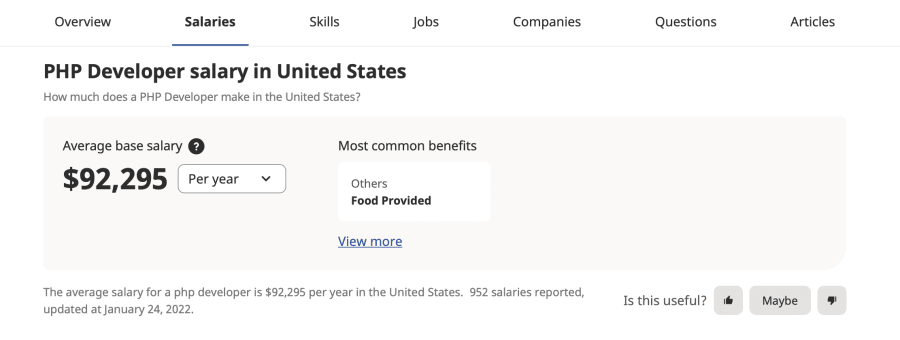
On Glassdoor, salary estimates are mostly based on reviews by current and previous employees of companies. The average salary is based on the average salary of all companies for a particular position, divided by the number of companies that have people working in said position.
However, when companies themselves provide an estimated average compensation, you can see it apart from the Glassdoor estimate.
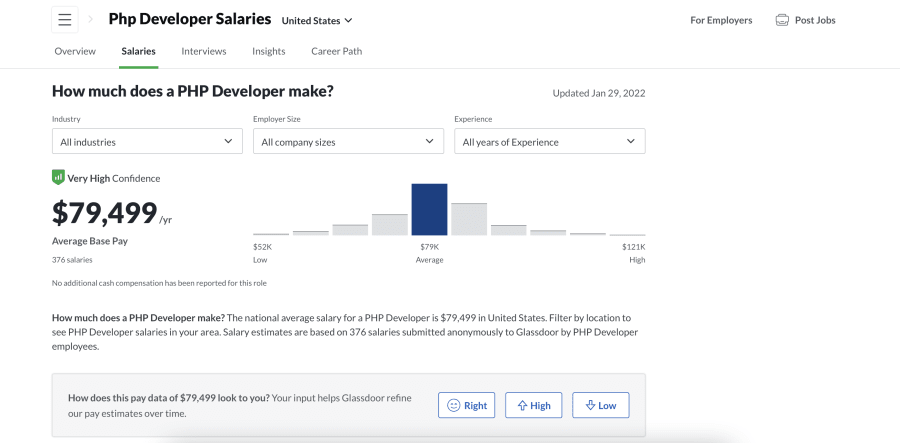
Researching employers and company culture
Make a list of employers with whom you'd like to work and go to their Company Page. You'll find feedback from former and current staff, CEO evaluations, and details about the hiring and interview process.
You might also learn more about a company's day-to-day operations by visiting their social media profiles. Look for fresh news articles about the company to stay up to date on what's going on.
Contact people you might know who work at a company on your target list via email or LinkedIn. Come prepared with specific questions for these discussions.
Finally, you can also use Glassdoor to look for member reviews. Word spreads through this grapevine, as people are usually honest about their experience working for a company when reviewing it to help future candidates.
Preparing your resume and cover letter
Writing a resume is a fickle art: you need to let recruiters know enough and impress them in mere seconds, but not include too much.
In fact, as of 2018 and onward, recruiters spend only a few seconds looking at resumes, before deciding whether that candidate should be considered for the job.
So, you need an effective, well-organized resume that accentuates the right things even from the first glance. Here are our best tips and practices.
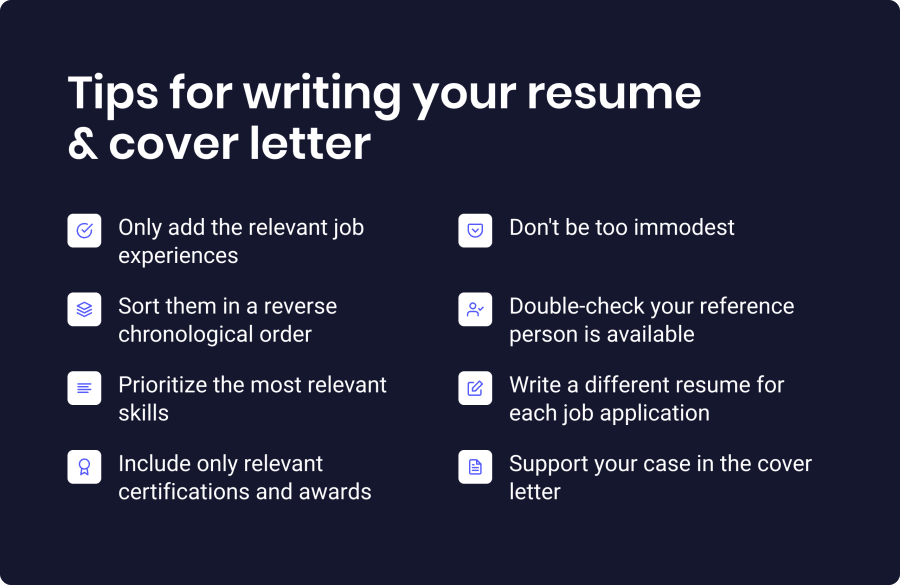
Only add the relevant experience
A common mistake job searchers do, is including all of their past job experiences. Although showing that your professional history is versatile and that you can learn and adapt to different positions, no one will read three pages of past jobs. Include only the ones that are relevant to what you are applying for now, and then explain that you have a longer experience in other positions in the cover letter.
Start from the most recent job
Don’t put things in chronological order, but in a reverse-chronological one: start from your current position all the way to the first one you had in a relevant industry.
Put the most important skills first
Prioritize the order of your skills too: from the frameworks for the job, then onto other ones, and then finish with soft skills and languages.
Include the certifications and awards that are relevant to the job you’re applying for
Once again, only pick out the achievements that matter to this particular job. It probably isn’t important if you can provide first aid, or if you were a spelling bee champion in high school.
Be a little bit modest
We all like to present ourselves in the best possible light in a resume. But, from my personal experience, people that go on and on about their achievements, speak in the third person and write a summary like they’re pitching a screenplay to a Hollywood exec, don’t come across as people I’d like to work with.
Make sure your reference person is available
If you added an email address or phone number of a person that gave you a reference a while ago, double-check if their information details are still correct. It will look like you’re lying about your reference if that person isn’t available on that number or email address.
There is no “one size fits all” resume!
Never ever think that you can apply to dozens of different job applications with the same resume. You need to tweak some details, change the prioritization of information and add different skills or certifications for different jobs.
Explain why you’re a good choice in the cover letter
A good practice when writing a cover letter, is to explain why you personally think you should be considered for the job, and why you would be passionate about working there. Then, follow with why they should hire you, and mention some of the reasons why you would be invaluable to the team.
As a plus, quote some of their brand values or motto, to show that you researched the company and you relate to their beliefs and culture. It will impress anyone reading the cover letter.
Using the power of personal branding
The same way that a company nurtures its own brand, you can do that through professional social media platforms or your own blog or website.
Your LinkedIn profile is a place where you can grow your network, but also a platform where you can display your achievements that are impossible to sneak into your resume. Let’s be real—recruiters will snoop around your profile if they didn’t scout you there in the first place.
Add featured projects and a nice summary of your personality and experience in the “About you” section. And don’t be shy to ask your colleagues and previous employers to give you a recommendation.
If you don’t have your own website, it might be a good time to make one. As a developer, it’s not only important from a personal branding point of view, but it is also a good way to show your skills in coding.
Finally, you can contribute to Medium or forums about development with your own opinion pieces, tutorials and tips. Everyone likes people who give back to the community, and being seen as a thought leader within your industry is a badge of honor you want to show to the recruiters.
Getting ready for the interview process
Apart from being on time, looking nice and having your resume in front of you to make sure you don’t have any inconsistencies in your answers, here are some tips to help you prep for your interview.
-
Research the company: By showing you know something about the company’s history, team and engagements, you will come across as proactive and curious—and those are great traits in a worker.
-
Be prepared to explain gaps or career switches: You might be asked why there is a big gap between jobs, or why you decided to completely change your career. Have an answer prepared without giving away too much.
-
Expect to be asked why you want the job: And be sincere! But don’t trash-talk your current workplace, as this is unprofessional and will reflect badly on you.
-
Be well-rested and focused: I know this sounds like advice coming from your mom, but it’s true. It’s better if you aren’t running on fumes for your interviews.
Nailing the technical interview or task
Once you’ve got to the point of doing a technical interview, it means that the people you’ve met so far are impressed with your resume and personality, but they want to see your skills in action.
And we’re not just talking about your technical skills and knowledge of coding. Your problem-solving abilities, willingness to learn and how you handle pressure are also under the magnifying glass.
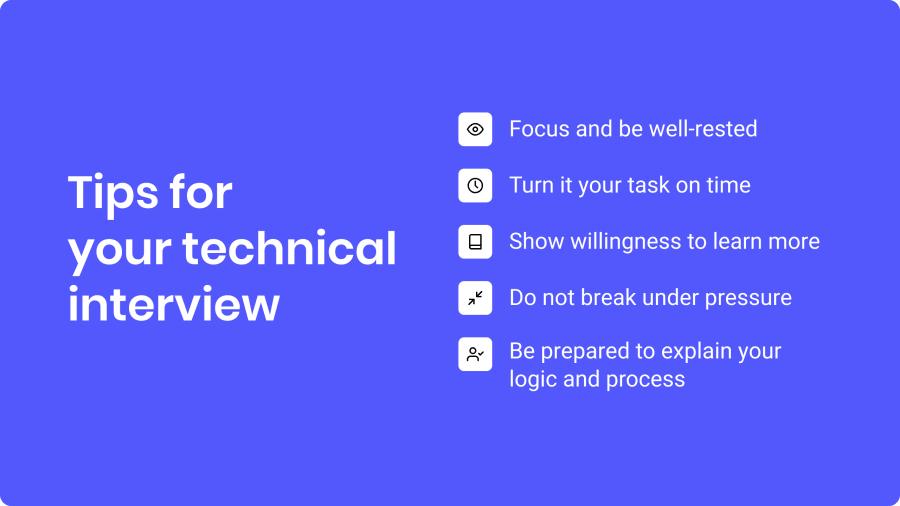
In case you get a test assignment to do at home, do your best to do it correctly and deliver it in a timely manner. It is understandable that you have your regular tasks, but if you have a deadline, do not be late with turning it in at all.
However, if your technical interview is happening in real-time, your coding knowledge will be put to the test while someone else is watching the process.
They will evaluate the program flow, data structures, and capabilities of the technology stack for which you're applying. The most important thing here, quite obviously, is to demonstrate that you know how to program in those languages.
When they inquire about your solution, you should be able to show that you are confident and can defend your logic and walk them through the process. Sort of like solving a math problem in front of the whole class.
After you submit your code, your syntax and semantics will also be reviewed. If you make a mistake, they'll try to figure out whether you're confused about the situation or you don't understand the language.
Don't be too concerned if you make a blunder. If it does happen, admit it and explain what happened.
Spotting the red flags
For many companies in an industry this competitive, employer branding and company culture are things worth investing in. But as with anything else in marketing, it is easy to sell something that doesn’t really exist.
So how can you know if the relaxing work environment and investing in the growth of team members is all smoke and mirrors? Here are a few tips.
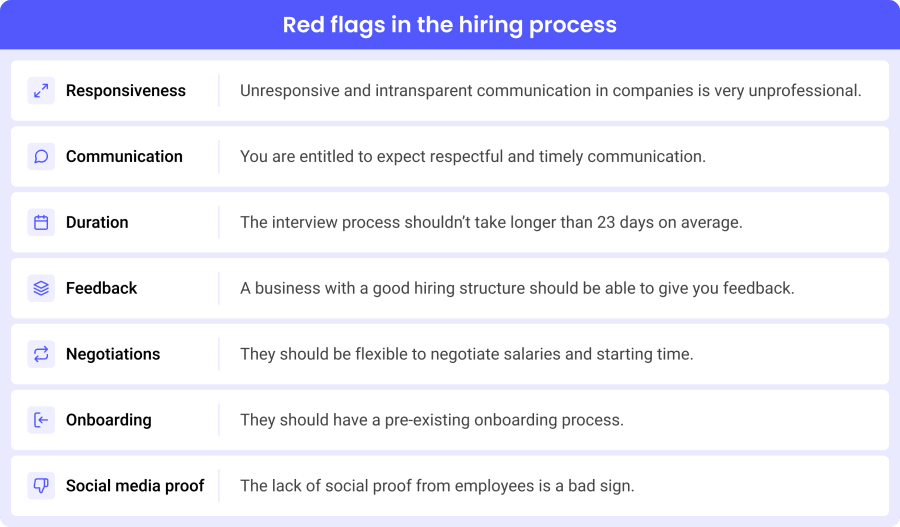
Responsiveness
The interview process is usually the first instance where you can sense something that doesn’t feel right, even though your research made it seem like this company is great.
If they don’t reply to your emails, take long intervals to decide on hiring you, reschedule meetings more than once, or disregard your questions about the position or compensation, take this as a warning.
There are two possible bad scenarios that make this happen: either they are purposely ignoring you because they don’t want to answer, or they don’t know how because they don’t have a system in place.
A third scenario is that they are overwhelmed and didn’t find the time, which can happen, but shouldn’t be a habit and seems irresponsible if it happens more than once.
Respectful communication
It costs nothing to be courteous and respectful. You are entitled to expect such communication, and if they don’t deliver, it is a red flag.
Duration of interviewing process
Sometimes hiring can take a long time, and the average interviewing process is different in industries, cultures and for different positions.
According to Glassdoor, the average interview process in the US is 23.8 days. Although you shouldn’t take it as gospel, you can use this estimate as a guideline for how long it should take for you to hear some feedback.
Feedback
One thing every person has come across when job searching is the frustration of never hearing any feedback until it’s time to do the next round of interviews. And if you don’t get the job, recruiters rarely give you the bad news. They just leave you hanging.
So, this is more of an extra point round than a red flag. But, if a recruiter takes the extra time to give you comments on how you did so far and whether or not to expect another interview, it says a lot about their dedication to nurturing. It makes you feel treated as a person, rather than just another resume forgotten in some folder.
Openness for negotiation
If a company is completely inflexible to negotiate a different compensation than they offered or don’t want to give you a comfortable time interval to transfer from another company, this lack of tolerance and transparency can keep happening in other instances as well. This can extend to other decisions that you need to make (or rather, accept) as their team member.
Onboarding process
Do they have a pre-existing plan for your onboarding, or do they do everything on the fly? A lack of structure can be a bad ‘omen’ for the time you need to spend as their member.
Social media and website
Do they have profiles on social media, especially LinkedIn? Do they have any photos of their employees? Do employees ever post about them? What are they talking about? Try to find people who are genuinely glad to be a part of the team, or have given a good recommendation.
Getting ready to start your new job
So, you’ve made it this far! Congratulations on your new job. But, before you join the ranks of the company that puts its trust in you, you can do some extra steps to impress them from day one.
Get acquainted with the current engagements they are working on and recent big updates. Read the company page if you didn’t do that yet, and learn what they value most as an organization.
If you have time, make a provisional plan of what your first tasks at the job will look like.
Prepare some questions about what your job will look like and if you need to do something ahead of time around onboarding or training.
And most importantly, put yourself in the right mindset for a fresh start. Switching a job can be tiresome and stressful, but with the right preparation, it will glide without any issues.

